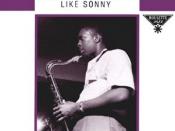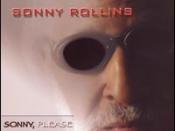After reading "Sonny's Blues"ÃÂ for the first time the reader may be tempted to categorize the story as nothing more than a sibling rivalry with a near-positive ending. After the second and third readings many underlying themes start to emerge, and the reader starts to understand many of the ideas that James Baldwin had when he wrote this story. The main conflict in the story is that the narrator's brother, Sony, can't seem to keep himself out of trouble. It begins with Sonny getting thrown in jail for drug charges. Sonny's brother, the narrator of the story, had lost touch with Sonny for a few years but the death of his daughter brings him to contact Sonny. The reader, through a series of flashbacks and arguments, is taken through what appears as a sibling rivalry between the narrator and Sonny. The narrator doesn't agree or support the actions of his younger brother Sonny.
Sonny, having been rebellious his entire life, disregards everything his brother says and Sonny's brother, having been a good decision maker his entire life, doesn't cut Sonny any slack. Sonny's outlook on life, "people ought to do what they want to do"ÃÂ(27), is a major problem for his brother. Sonny is made out to be the bad guy in the situation. Partially because of his drug addiction and partially because the story is from the perspective of his brother who reprimands his actions pretty consistently. It is easy for Sonny's brother to get on Sonny's case for his obvious flaws, but does he really think the situation through enough? Is the narrator acting too harshly towards Sonny? That raises the big question in this story, who is more at fault, Sonny or his Brother? I believe that the narrator is too hard on Sonny. Aside from Sonny's drug problem, he is a pretty good guy. There is also the possibility that Sonny acts the way he does because he gets such a negative response from his brother. Sonny's brother probably just feels guilty for the fact that he promised his mother that he would "hold on to [his] brother and don't let him fall, no matter what it looks like is happening to him"ÃÂ(25).
Sonny obviously has a drug problem, and sort of a psychological problem for that matter, however his brother has a few problems of his own that he has not come to terms with. As mentioned before, the unfulfilled promise that the narrator made with his deceased mother is eating away at him. Sonny's brother should step out of context and accept his brother for who he is instead of who his mother expected him to be. That doesn't necessarily mean accepting his drug problems, but just accepting Sonny as an actual thinking person. Once he has done that he can begin to have civilized conversations with him and possibly get things solved. Almost everyone knows somebody with a bad habit or somebody that just consistently makes bad decisions, and almost everyone's gut reaction to that person they know is negative. This is the same predicament that Sonny's brother is in. When he talks to Sonny or finds out about his latest mishap, he blows his top and doesn't know how to control his feelings. That's not saying that it is right to not say anything, but maybe not speak so harshly. Things get accomplished easier when two people have a civilized conversation. Sonny's brother is a smart guy and knows exactly how he could get his brother to actually listen to him but he gets caught up in the moment and resorts to scolding Sonny as if he were his child.
It is very easy to blame someone for his or her lifestyle without thinking it through but it takes a much stronger person to evaluate the situation and decide what is actually the person's own fault. This idea brings up one of the main underlying themes of this short story, "How much can you blame a person for his or her wrong actions?"ÃÂ Sonny's actions don't physically hurt anyone but himself, but that doesn't make him or her right. So where is the happy medium in this situation? Exactly how much of Sonny's bad decision making is his own fault? Author Kurt Vonnegut, in the introduction to his novel Breakfast of Champions, said that he is always tempted to create a character and "say that he is what he is because of faulty wiring, or because of microscopic amounts of chemicals which he ate of failed to eat on that particular day."ÃÂ This is the basis of an argument that has haunted people for many years. Not only in personal situations but even in legal situations. How often is there a story in the paper about someone being declared mentally insane in a court of law and dodging a prison sentence. I am not saying that Sonny should be allowed to live a normal life without anyone giving him a hard time because he has no control over the chemicals in his head, but his brother should realize that Sonny really can't help the way he feels sometimes.
When Sonny and his brother have their confrontation while the choir is singing in the street Sonny says, in regards to suffering, "Everybody tries not to. You're just hung up on the way some people try--it's not your way"ÃÂ(33). I would say that this statement sums up the purpose of the story. They both agreed that everyone has to suffer. Some people can't help the way they deal with suffering. I think that this part in the story is the first sign of a turning point between Sonny and his brother. Even though Sonny's brother doesn't show a major change until the end of the story this discussion is clearly a small step towards resolution. It represents a common ground Sonny and his brother can meet on. Seeing someone you love pour himself or herself out, and tell you how they truly feel, instead of just refuting your argument can result in a huge change in the way you feel towards that person. He began to feel Sonny's pain and question if Sonny could help, or even should have helped the way his life had gone so far. Sonny's brother comes to realize that the product was worth the production cost.
Sonny's brother goes through a complete change of heart in the end when he watches Sonny play live. Right before the end of the story while the narrator is watching Sonny play, he steps into reality and comes to a serious conclusion in his life. Sonny's brother thinks, "I saw my mother's face again, and felt, for the first time, how the stones of the road she walked on must have bruised her feet. I saw the moonlit road where my father's brother died. And it brought something else back to me, and carried me past it, I saw my little girl again and felt Isabel's tears again, and I felt my own tears begin to rise. And I was yet aware that this was only a moment, that the world waited outside, as hungry as a tiger, and that trouble stretched above us, longer than the sky"ÃÂ(37). This is a very vivid description of what he was thinking at the time. It can be applied to almost any life experience that can be thought of. If at any time we took a step back and compared our problems with the problems of the world we would feel foolish for having ever worried about them. This is precisely what happens to the narrator at this point. It takes different things to make people come to their senses. Foe Sonny's brother, it was seeing his younger brother do what he had a deep passion for. At this point the narrator realizes that this is the way things had to been any other way, then Sonny wouldn't be Sonny.
In closing, the situation at hand, Sonny's drug problem, doesn't even get solved. Sonny doesn't decide to quit using drugs or even slightly change his lifestyle and his brother doesn't decide that Sonny's lifestyle is right, but the few connecting minutes that the two share is enough to let the reader know that even if things don't change on the outside, both characters will surely change on the inside. I think even Sonny would start to show improvement after he sees that his brother is a little closer to understanding him. Sonny and the narrator both came out of the situation better people. The narrator, as well as the rest of the people that are faced with a situation similar to his, had to learn to accept a person for who they are and not what their actions are. Whether the actions had to do fully with chemicals or not is a question that was far from being solved, and still is, so for the time being Sonny's brother had to work with his common sense to get things solved.





